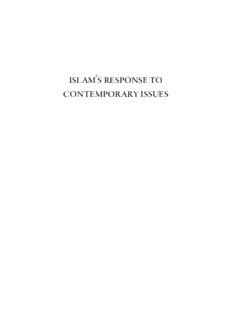
Islam's Response to Contemporary Issues - Ahmadiyya Muslim PDF
Preview Islam's Response to Contemporary Issues - Ahmadiyya Muslim
Islam’s Response to Contemporary Issues OTHER BOOKS BY THE SAME AUTHOR Absolute Justice, Kindness and Kinship— The Three Creative Principles Christianity—A Journey from Facts to Fiction An Elementary Study of Islam The Gulf Crisis and the New World Order Homeopathy: Like Cures Like Murder in the Name of Allah Revelation, Rationality, Knowledge and Truth The Seal of the Prophets, His Personality and Character The True Islamic Concept of Jihad The Truth About the Alleged Punishment for Apostasy in Islam With Love to the Muslims of the World About The Author Hadrat Mirza Tahir Ahmad (1928–2003), may Allah have infinite mercy on his soul, a man of God, Voice articulate of the age, a great orator, a deeply learned scholar of phenomenal intelligence, a prolific and versatile writer, a keen student of comparative religions was loved and devoutly followed by his more than 10 million Ahmadi Muslim followers all over the world as their Imam, the spiritual head, being the fourth successor of Hadrat Mirza Ghulam Ahmad (the Promised Messiah and Mahdias), to which august office he was elected as Khalifatul Masih in 1982. After the promulgation of general Zia-ul-Haq anti-Ahmadiyya Ordinance of 26th April 1984 he had to leave his beloved country, Pakistan, and migrated to England from where he launched Muslim Television Ahmadiyya International (MTA) which would (and still does) telecast its programmes 24 hours a day to the four corners of the world. Besides being a religious leader, he was a homeopathic physician of world fame, a highly gifted poet and a sportsman. He had his schooling in Qadian, India, and later joined the Govt. College, Lahore, Pakistan, and after graduating from Jami‘ah iv Islam’s response to contemporary issues Ahmadiyya, Rabwah, Pakistan with distinction, he obtained his honours degree in Arabic from the Punjab University, Lahore. From 1955 to 1957 he studied at the School of Oriental and African Studies, University of London. He had a divinely inspired and very deep knowledge of the Holy Quran which he translated into Urdu. He also partially revised and added explanatory notes to the English translation of the Holy Quran by Hadrat Maulawi Sher Alira. Revelation, Rationality, Knowledge and Truth is his magnum opus. Though he had no formal education in philosophy and science, he had a philosophical bent of mind and tackled most difficult and abstruse theological-philosophical questions with great acumen and ease and his intellectual approach was always rational and scientific. For a layman he had an amazingly in-depth knowledge of science, especially life sciences which attracted him most. He also had deep knowledge of human psychology. His was an analytical mind of high intelligence—an intellect scintillating with brilliance, capable of solving knottiest problems with ease, leaving his listeners and readers spellbound. Islam’s Response to Contemporary Issues (cid:22) Mirza Tahir Ahmad Islam International Publications Ltd. Tilford, Surrey Islam’s Response to Contemporary Issues by Mirza Tahir Ahmad Copyright by Islam International Publications Ltd. First published in the United Kingdom (paperback) 1992 Reprinted 1993, 1997 Present edition (hardback) 2007 Published by Islam International Publications Ltd. Islamabad, Sheephatch Lane Tilford, Surrey GU10 2AQ Printed at Raqeem Press Islamabad, Tilford, Surrey Cover design and book layout by Salman Muhammad Sajid Index prepared by Abdul Majid Shah All rights reserved. No part of this publication may be reproduced, stored in a retrieval system, or transmitted in any form or by any means, electronic, mechanical, photocopying, recording, or otherwise, without the prior written permission of the publisher. ISBN 1 85372 888 8 Contents Publisher’s Note.............................................................xiii Foreword to the Present Edition...................................xvii Preface to the First Edition............................................xix Introduction..........................................................3 Absence of Peace.............................................................3 Islam’s Contribution to World Peace........................4 One Inter-Religious Peace...........................................7 Religious Values Have Become Redundant..............7 Universality of Prophethood........................................9 All Prophets Are Equal................................................11 Can Rank Be Different If Authenticity Is Equal?..................................................12 Salvation Cannot Be Monopolised by Any Single Religion.................................................19 Promotion of Harmony and Mutual Respect Amongst Religions........................................................24 The Universality Concept..........................................24 Islam Is a Universal Religion......................................26 Instruments of Struggle—No Compulsion............31 viii Islam’s response to contemporary issues Survival of the Fittest...................................................34 Freedom of Speech........................................................35 Liberty and Emancipation in the Context of the Contemporary World......................37 Blasphemy.......................................................................38 Inter-Religious Cooperation......................................44 Conclusion.....................................................................45 Two Social Peace.........................................................55 Contemporary Social Order.......................................55 Two Climates of Social Order...................................60 Vanity of a Materialistic Society and Its Ultimate Destination.............................................60 Rejection of Life to Come...........................................62 Four Characteristics of a Materialistic Society.......66 Accountability...............................................................67 Islamic Social Climate..................................................79 Fundamentals of an Islamic Society..........................83 Chastity...........................................................................85 Segregation of Sexes......................................................89 The Dawn of a New Age in Women’s Rights........90 Equal Rights for Women.............................................93 Polygamy.........................................................................95 Care of the Aged.........................................................103 The Future Generation.............................................107 Wasteful, Vain Pursuits Discouraged....................110 Bridling of Desires......................................................112 Building of Trust and Inviolability of Trusts and Treaties....................................................114 Contents ix Eradication of Evil— A Collective Responsibility......................................114 Do’s and Don’ts..........................................................117 Rejection of Racialism...............................................120 Three Socio-economic Peace.....................................137 Economic Justice under Capitalism, Socialism and Islam.............................137 Spending in a Good Cause Even in Adversity.....140 Spending in the Cause of the Poor.........................140 Gratitude......................................................................142 No Human Reward for Favours.............................145 Begging.........................................................................147 What Can Be Given in Charity?............................149 Giving Openly and Secretly.....................................150 Social Responsibilities...............................................150 An Example from Early Islam.................................151 Extended Boundaries of Expenditure....................153 Service to Others........................................................154 Prohibition of Drinking and Gambling................154 Four Economic Peace...............................................165 Economic Philosophies of Capitalism, Communism and Islam............................................165 Capitalism....................................................................165 Scientific Socialism....................................................166 Islamic Concept..........................................................168 Four Characteristics of a Capitalist Society.........169 Capitalism Ultimately Leads to Destruction.......169 The Changing Economic Order.............................170 Islamic Economic System.........................................173 x Islam’s response to contemporary issues Zakat.............................................................................175 Prohibition of Interest..............................................178 High Interest Rates in Britain.................................178 Other Evils of Interest...............................................182 Interest as a Threat to Peace....................................188 Prohibition of Hoarding of Wealth.......................190 Simple Lifestyle...........................................................192 Matrimonial Expense................................................193 Accepting Invitations from The Poor...................194 Moderation in Eating Habits..................................194 Borrowing Money......................................................195 Economic Class Differences....................................199 Islamic Law of Inheritance.......................................201 Prohibition of Bribery...............................................201 Commercial Ethics....................................................202 Basic Needs..................................................................204 Worship as a Means of Economic Unity..............208 International Obligations........................................210 Five Political Peace...................................................219 Political Peace Has to Be Carefully Examined at the National and International Level................219 No Outright Condemnation of Any Political System..................................................220 Monarchy.....................................................................221 Defining Democracy.................................................224 Islamic Definition of Democracy...........................226 Two Pillars of Islamic Concept of Democracy....226 Mutual Consultation Preferred..............................227
Description: